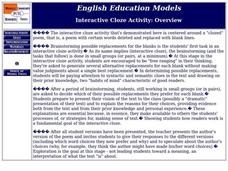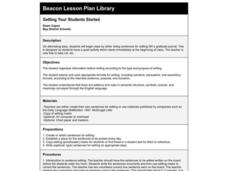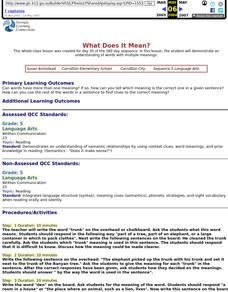Curated OER
Cloze Activity
Young scholars brainstorm possible replacements for blanks in a cloze activity. They work in groups to decide which of their possible replacements are prefered for each blank. They then prepare to present their ideas of the text to the...
Curated OER
Inferring Character Traits
Here is a lesson which is "flexible," and can operate as an individual or whole class activity. After reading a book of their choosing, with the use of a semantic map, learners identify character traits. They infer how their feelings...
Curated OER
The Grouchy Ladybug By Eric Carle
Second graders complete a unit about ladybugs based on Eric Carle's, The Grouchy Ladybug. They complete comprehension questions, categorization activities, Venn diagrams, and choral readings of Susan M. Paprocki', Little Red Bug. As they...
Curated OER
Lights, Camera, Action!
First graders complete a variety of activities in which they practice recognizing verbs including a word guessing game. After a lecture/demo, 1st graders use worksheets imbedded in this plan to play the verb recognition game.
Curated OER
Getting Your Students Started
Third graders begin by either doing sentences for editing OR a gratitude journal. This is designed so students have a quiet activity which starts immediately at the beginning of class.
Curated OER
Bedtime Fun
Learners use picture clues to sound out the beginning of words. They apply this story to them actually going to bed. At the end, students should be able to follow a story line to a conclusion. To engage learners, the teacher asks...
Curated OER
Comic Strip Context Clues
Second graders create dialogue for a comic strip using context clues to match the text to the pictures. They use comic blanks imbedded in this lesson. They write dialogue for each frame. Remind them to use the picture clues when writing...
Curated OER
INSECTS AROUND US
Students identify characteristics of insects and if insects help or harm us. They describe the stages of metamorphosis.
Curated OER
Landforms
Young scholars study how landforms affect all aspects of a community. Students work in groups to identify landforms from other works of art. In cooperative groups Young scholars select a work of art depicting a particular land form and...
Curated OER
Weather Watchers
Second graders discuss what weather is and list words that can be used to describe weather. In this science lesson, 2nd graders develop symbols for each type of weather and record the weather for two weeks at the same time and the same...
Curated OER
Plant Parts
Pupils create a model of the parts of a plant. After reviewing the parts of a plant and their function, students working in groups, construct a plant using various provided materials. Their models are labeled and presented to the...
Curated OER
Landforms
Pupils begin their examination of landforms. Using a map, they locate and identify the major landforms on Earth. They discuss how landforms affect the lifestyle of the community and determine which goods and services the community produces.
Curated OER
Comparing and Contrasting
Students listen to the story "Bloomers" and discuss the differences between men and women in the past. They chart their guesses about women's rights in history.
Curated OER
What Does It Mean?
Students demonstrate an understanding of words with multiple meanings. They give the meaning for each "trunk" in the sentence.
Curated OER
What Is A Dinosaur?
Students use the question of "What is a dinosaur?" in order to establish the context for a class investigation. They use a variety of resources in order to gather information. Students compare and contrast the similarities or differences...
















